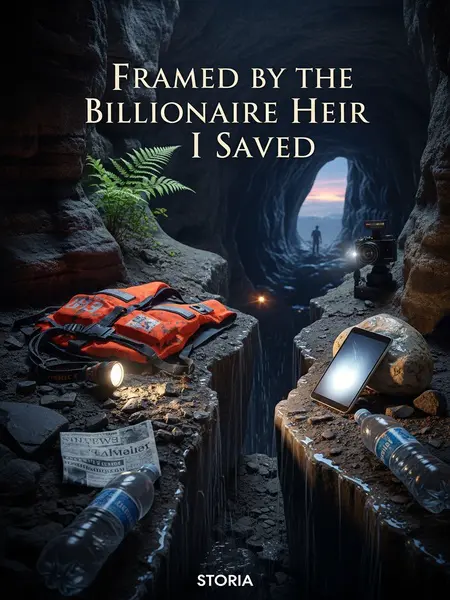Chapter 1: Descent
The wealthy trust fund kid loved to challenge himself with extreme diving.
Growing up in the shadow of his famous family’s expectations, Carter Evans got his kicks from risks that would make most people shudder. Extreme diving was just the latest obsession. His Instagram was a museum of stunts: leaping off rocky cliffs at Lake Tahoe, hanging from waterfalls in Oregon, grinning beside the barnacled hulls of sunken ships off the Florida coast. The more dangerous the stunt, the more likes—and Carter craved every one.
Trying to break the world record, he dove alone into a cave two hundred feet deep and got himself trapped.
He ignored every warning, laughed off the safety briefings, and rolled his eyes at veteran divers’ advice. This was America, right? Land of the bold, the reckless, the ones who don’t know when to quit. GoPro strapped to his chest, Carter slipped through the mossy mouth of Devil’s Bend, live-streaming to thousands. The world record and online glory dangled just out of reach. Nobody was surprised when it all went wrong.
As a diver, I spent nearly a whole day trying to save him.
My name’s Mike Taylor, and by then, I was known as one of the best cave divers in the Midwest. My hands were steady, my nerves like steel, but that rescue nearly broke me. I still remember the crushing weight of the cold water, the metallic tang in my mouth, the hiss of my regulator, the rescue team’s urgent voices crackling through the radio. Every second mattered. I was the only one in the county with the guts and training to go that deep and bring him out alive.
But after the rescue, he teamed up with the media to accuse me of trying to kill him underwater.
That’s how it goes in this country: one day you’re the hero, the next you’re the villain. Carter hit every network, talking up his trauma. Under the harsh glare of the local news, voice shaking, he painted me as a jealous monster hell-bent on sabotaging his world record. The story caught fire.
Even though knocking him out was a last resort, my reputation was trashed, and the national diving competition was called off.
I’d always played by the book, but the internet jury doesn’t care about facts. Sponsors bailed. The competition committee sent a polite email: “In light of recent events, we must postpone your participation.” For weeks, every headline twisted my name into something ugly.
Even my professional diving license got revoked.
No appeal. No hearing. Just a certified letter from the Professional Association for Diving. My stomach dropped before I even opened the envelope. “License revoked for gross misconduct.” Twelve years of my life gone, just like that. I boxed up my gear, stashed my trophies, and let my apartment grow silent.
A year later, the same rich kid tried the stunt again—and got trapped once more.
Some people never learn. My hands were still callused, my instincts sharp, but my career had moved on without me. I watched his second attempt on the news, a sick mix of disbelief and grim déjà vu. Carter Evans was back in the headlines—solo dive, no spotter, no fear, and even more reckless than before.
And in that area, I was still the only one who could reach him.
I didn’t want any part of it. But in southeast Ohio, there aren’t many who can handle Devil’s Bend. People remembered me, for better or worse. When push came to shove, the Carter family wanted results—not excuses.
Just as I finished my warm-up stretches in my small-town Ohio apartment, I got an urgent call.
The sun wasn’t even up. The old furnace rattled in the corner while I sipped instant coffee from a chipped Browns mug. My phone blared the emergency ringtone I’d set years ago. I hesitated, rubbing my sore shoulder, then picked up. It was a buddy from the sheriff’s office, panic in his voice.
“Mike, did you see the news? That Carter family heir tried a solo dive—now he’s missing. Nobody knows if he’s alive or dead.”
His words tumbled out, breathless. I pictured him hunched over his battered desk at the station, eyes glued to the local news, coffee going cold. The fear in his voice chilled me, though I’d already guessed what happened.
Of course, I already knew.
I’d seen Twitter blowing up the night before—#CarterEvans, #DevilsBend, people posting screenshots, speculating, some even making memes about rich kids getting in too deep. I tried to ignore it, but the knot in my gut only grew tighter.
According to diving protocol, you always go down with a buddy. That’s diving 101—hammered into your head by every instructor from Miami to Michigan. In America, lawsuits and waivers are as common as air tanks. You never, ever go solo—unless you want to end up a headline.
But Carter Evans wanted internet fame, and he went down alone.
He livestreamed the whole thing, his phone pinging every minute with likes and “Go big or go home” comments from people who’d never put on a wetsuit. Sponsors paid for every second of his recklessness.
Worse, he chose Devil’s Bend—a cave only I had ever made it through alive.
Locals called it cursed. The news called it ‘America’s most dangerous cave system.’ I called it a nightmare—a pitch-black labyrinth of tunnels, sharp turns, silt that blinds you at the first touch. You only survived if you respected it—and most didn’t.
Devil’s Bend is jagged and uneven, with multiple levels twisting through the earth. It stretches over four and a half miles, the deepest point over two hundred and sixty feet down. The deeper you go, the harder it is to find your way back.
Water temperatures dropped near freezing, and currents shifted without warning. Your body ached from the cold before your mind even registered the danger. Stories of people getting lost forever were told around every campfire and local TV segment. As a kid, I’d ride my bike past the warning signs, daring myself to get close. Now, it was the place that nearly ended me.
Even with a dozen years of experience, I’d almost lost my life there. Carter Evans, with barely a year of diving, didn’t stand a chance.
Experience and bravado are separated by scars—and funerals. My left knee still twinged from getting snagged on a ledge, and my mom’s voice haunted me: “You’re gonna get yourself killed, Mikey.” Carter thought the rules didn’t apply to him.
The whole internet had watched his livestream. Five hours ago, he dropped his gear and got wedged at a bend in the cave.
His GoPro feed went black, chat exploding with panic and speculation. People called 911. The Carter PR team spun it as a hiccup, but every diver knew this was bad—really bad.
The divers the Carter family sent all came back empty-handed. Their skills just weren’t enough.
I heard they even flew in a hotshot from Florida—some National Geographic guy. He lasted thirty minutes before tapping out. The local rescue teams did their best, but Devil’s Bend chews up nerves and spits out hope.
There was no response to their calls.
Radio silence. The rescue line came back with nothing but silt and a busted flashlight. Tension hung over the search area—anxious parents, pacing sheriffs, and news vans with satellite dishes hungry for drama.
Desperate, Mr. Carter showed up and offered me $700,000 to bring his son out alive.
He arrived in a black Escalade, bodyguards in tow, face carved with worry. No pleasantries—just a raw offer, numbers cold as the air. Even after all they’d done to me, I couldn’t ignore a life on the line.
I asked him, “If your son’s already dead, or something happens on the way back, am I responsible?”
My voice stayed calm, but my mind raced. In America, liability is everything. I wanted it on record—if this turned into a body recovery, or Carter did something stupid again, I wasn’t going to be the scapegoat.
From his last livestream images, I could tell he was trapped in the worst spot—a squeeze only one person could fit at a time.
I’d watched the footage frame by frame: jagged outcroppings, a tight squeeze, Carter’s eyes wide with panic. Every diver knew to avoid that spot—it was a death trap.
I couldn’t guarantee I’d get him out alive.
The risk was off the charts. No backup, no easy way out, every second counting down. I didn’t know if I’d be bringing out a survivor or a body.
Mr. Carter was silent for a long time, then finally scrubbed his face and said, “Just try, Mike. I’ll sign whatever you need. Just… bring him back.”
I immediately prepped my gear with my teammate and got ready to dive.
Jason, my old dive partner, pulled up in his beat-up Ford, trunk loaded with wetsuits, spare tanks, and enough snacks to last us through the night. We ran our checks, talking through every scenario. My heart hammered, but my hands stayed steady.
By then, it was nearly dusk. Underwater visibility was dropping, making the rescue even tougher. But saving a life came first.
We drove out to Devil’s Bend as the last light faded, headlights bouncing off potholes. The air was crisp, trees casting long shadows. Media vans lined the lot, floodlights blazing at the cave mouth. I could smell the fear, the sweat, the stale coffee from search teams huddled above ground.
Based on the oxygen tank Carter took, he wouldn’t last through the night.
I did the math: tank size, exertion, cold water. The numbers weren’t good. We needed to move—fast.
I trusted my memory, avoiding the most dangerous routes.
Every twist and turn of Devil’s Bend was burned into my brain. I led Jason past choke points, signaling with my headlamp. We left neon line markers behind us, breadcrumbs to find our way back—just like my old Navy coach taught me.
After more than two hours, I finally reached the spot where Carter Evans was trapped.
My body ached from the cold, but adrenaline kept me moving. My flashlight caught the silver glint of his tank wedged between boulders, his arm twisted at a bad angle. His eyes were wild behind his mask—terror had set in deep.













